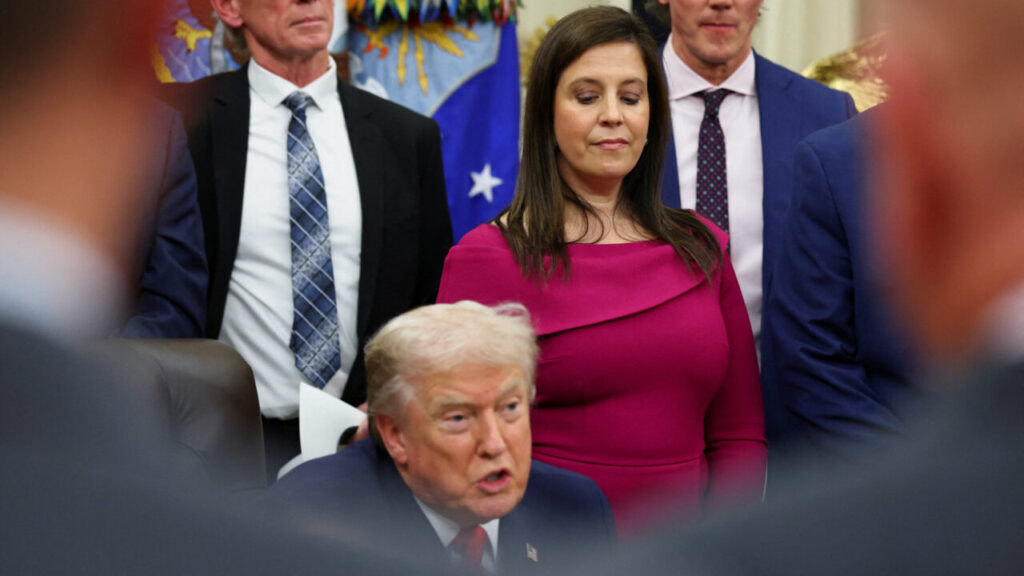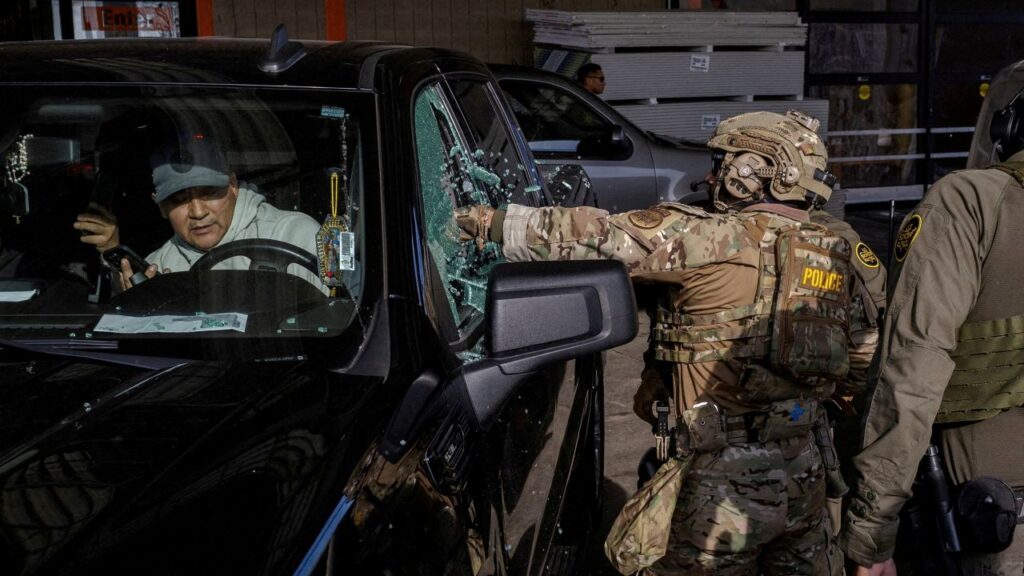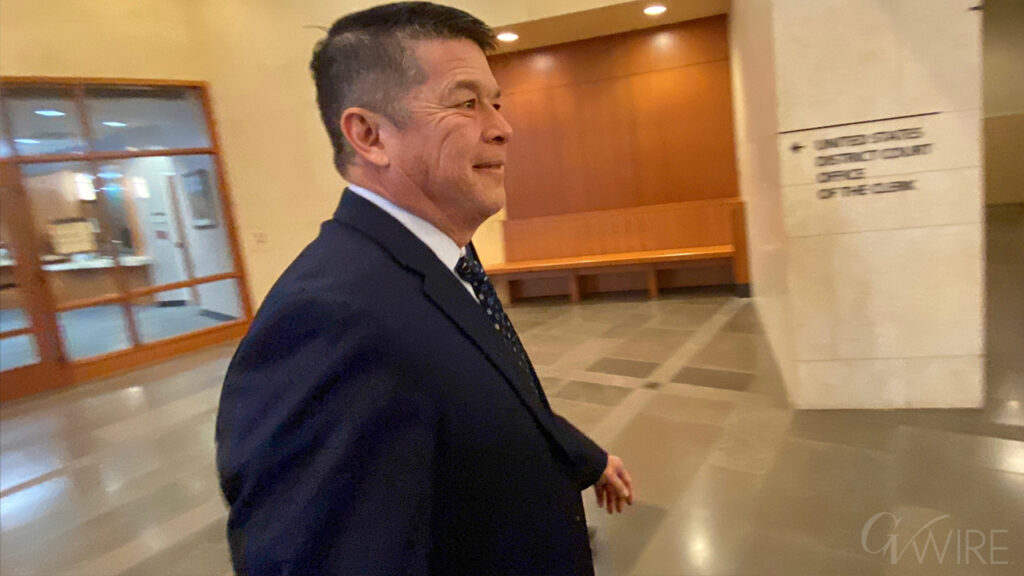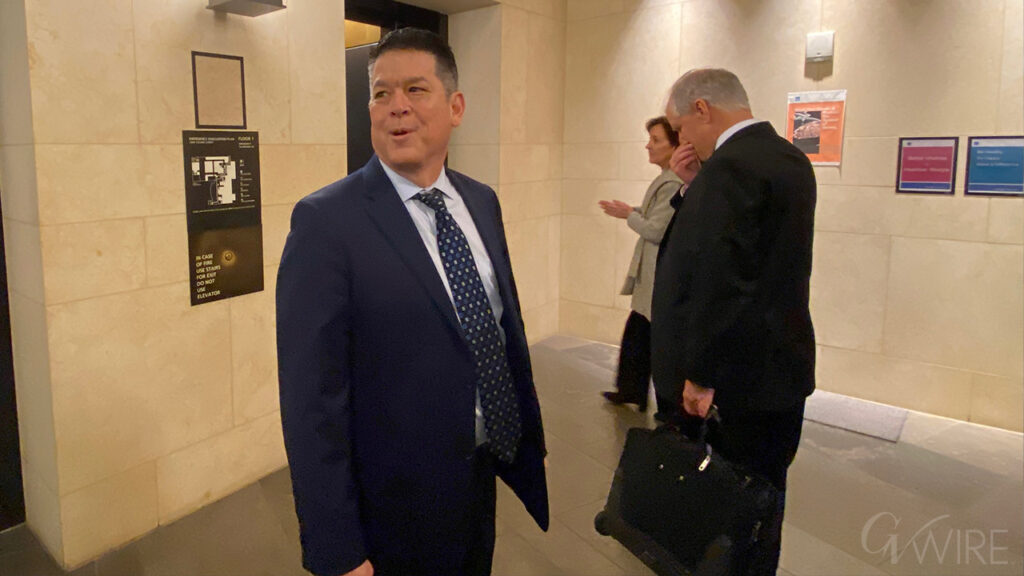A woman works in a California strawberry field. President Donald Trump again changed his mind, saying he would target worksites for immigration raids. (Shutterstock)

- President Donald Trump on Tuesday again changes his mind, saying immigration raids will take place at worksites, including farms and restaurants.
- Top White House Aide Stephen Miller in May raised immigration arrest quotas to 3,000 per day.
- Manuel Cunha, president of the Nisei Farmers League, questions who is really in charge at the White House.
Share
U.S. immigration officials on Tuesday walked back limits on enforcement targeting farms, restaurants, hotels and food processing plants just days after putting restrictions in place, two former officials familiar with the matter said.
The reversal is an abrupt shift that followed contradictory public statements by President Donald Trump.
After the reversal, many farmworkers are frustrated, frightened, and in a state of disbelief, said Manuel Cunha, president of the Fresno-based Nisei Farmers League.
“They don’t know what to believe anymore,” Cunha said. “They are so scared of now knowing are they going to get apprehended tomorrow or not at the farm?”
U.S. Immigration and Customs Enforcement leadership told field office heads during a call on Monday that it would roll back a directive issued last week that largely paused raids on the businesses, the former officials said, requesting anonymity to discuss the new guidance.
ICE Has 3,000-Per-Day Arrest Quota
ICE officials were told a daily quota to make 3,000 arrests per day — 10 times the average last year during former President Joe Biden’s administration — would remain in effect, the former officials said. ICE field office heads had raised concerns they could not meet the quota without raids at the businesses that had been exempted, one of the sources said.
In a statement to GV Wire, Assistant Secretary of the Department of Homeland Security Tricia McLaughlin said worksite enforcement is a cornerstone of the department’s efforts.
“The President has been incredibly clear. There will be no safe spaces for industries who harbor violent criminals or purposely try to undermine ICE’s efforts. Worksite enforcement remains a cornerstone of our efforts to safeguard public safety, national security, and economic stability,” McLaughlin said. “These operations target illegal employment networks that undermine American workers, destabilize labor markets, and expose critical infrastructure to exploitation.”
One Raid Could Shut Down an Entire Industry: Cunha
Cunha said an immigration sweep at a packinghouse could cause an entire shutdown of the industry.
“It’s not just that one packinghouse, it’s that every worker will not go to work tomorrow in any industry of ag,” Cunha said. “What happens to the fruits and vegetables? But even worse, what happens to those workers because they’re gonna have any income. How do they survive to keep their families alive? And is the intention to starve them so they have to leave? I would hope not.”
It was not clear why last week’s directive was reversed. Some ICE officials left the call confused, and it appeared they would still need to tread carefully with raids on the previously exempted businesses, the former officials said.
The Washington Post first reported the reversal.
Immigration Arrests Double Under Trump
Trump took office in January aiming to deport record numbers of immigrants in the U.S. illegally. ICE doubled the pace of arrests under Trump compared with last year but still remains far below what would be needed to deport millions of people.
Top White House aide Stephen Miller ordered ICE in late May to dramatically increase arrests to 3,000 per day, leading to intensified raids that prominently targeted some businesses.
Trump said in a Truth Social post on Thursday that farms and hotel businesses had been suffering from the ramped up enforcement but also said, without evidence or explanation, that criminals were trying to fill those jobs.
ICE issued guidance that day pausing most immigration enforcement at agricultural, hospitality and food processing businesses. But in another Truth Social post on Sunday, Trump called on ICE to target the Democratic strongholds of Los Angeles, Chicago, and New York and to use the full extent of their authority to increase deportations.
‘Who’s Running the White House?’
After Trump indicated he would not go after worksites, Cunha said he hoped for an executive order. The reversal on Tuesday caught Cunha off guard.
“Who’s running the White House? Is it the president of the United States or is it the staff like under (former President Joe) Biden?” Cunha said. “Because I have a real concern that the president is saying these things and then he’s being overrun by his own staff.”
A White House official said Trump was keeping a promise to deliver the country’s single largest mass deportation program.
“Anyone present in the United States illegally is at risk of deportation,” the White House official said.
Deborah Fleischaker, who held senior roles at both DHS and ICE during Biden’s presidency, said the shifting ICE guidance reflects broader turmoil at the agency since Trump took office. The White House has ousted multiple ICE leaders as it pressed for more arrests.
“It has been chaos and confusion since the beginning,” she said.
Farmers Push Back
The intensified ICE enforcement after Miller’s late May order renewed long-running concerns among farmers about ICE operations targeting their workforce. Nearly half the nation’s approximately 2 million farm workers lack legal status, according to the departments of Labor and Agriculture, as do many dairy and meatpacking workers.
Farm industry fears escalated last week when ICE detentions and arrests of workers were reported at California farms, a Nebraska meatpacking plant and a New Mexico dairy.
Livestock and restaurant sector representatives said on a press call organized by the American Business Immigration Coalition on Tuesday that raids make operations more difficult in their heavily immigrant-dependent industries.
“The people pushing for these raids that target farms and feedyards and dairies have no idea how farms operate,” said Matt Teagarden, CEO of the Kansas Livestock Association.
Michael Marsh, CEO of the National Council of Agricultural Employers, said farm groups had not had enough input into the administration’s decision-making so far on immigration enforcement in agriculture.
Marsh said he had not received responses from Agricultural Secretary Brooke Rollins, Homeland Secretary Kristi Noem, and other officials to a letter sent last week requesting a meeting.
“We’ve got a serious issue if we have almost a million of our workers that are going to be subject to deportation,” he said. “Because if that’s the case, and they are picked up and they are gone, we can’t fill those positions.”



















